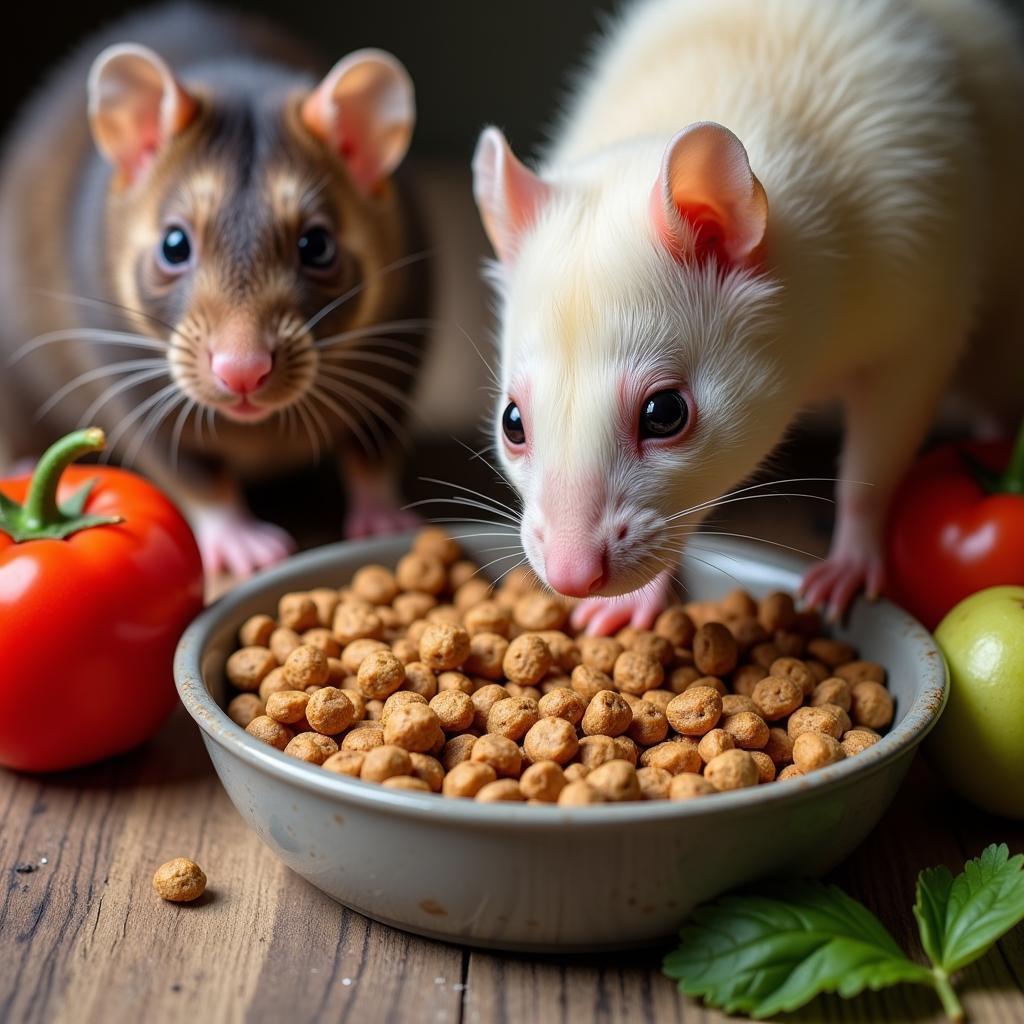You’re likely here because you’re a responsible pet owner wondering, “Can Rats Eat Ferret Food?” It’s a valid question! After all, rats and ferrets are both small, curious creatures with a knack for getting into mischief. While they might seem similar at first glance, their dietary needs are quite different.
 Rat and Ferret Enjoying Their Meals
Rat and Ferret Enjoying Their Meals
Understanding Your Rat’s Nutritional Needs
Rats, those adorable little mischief-makers, are omnivores. This means they thrive on a varied diet consisting of both plant and animal-based foods. A balanced diet for a pet rat should primarily consist of a high-quality, commercially formulated rat food. These pellets are specifically designed to meet their unique nutritional requirements, including protein, carbohydrates, vitamins, and minerals.
- Protein: Essential for muscle growth and development.
- Carbohydrates: Provide energy for their active lifestyle.
- Vitamins and Minerals: Support overall health and well-being.
Why Ferret Food Isn’t Suitable for Rats
Ferrets, unlike rats, are obligate carnivores. This means their bodies are designed to digest and obtain nutrients primarily from meat. Their diet should consist of food that’s high in animal protein and fat, with minimal carbohydrates.
Here’s why feeding ferret food to your rat is a bad idea:
- High Protein Content: Ferret food contains significantly higher protein levels than rat food. While protein is essential for rats, excessive amounts can put a strain on their kidneys.
- Fat Content: The high-fat content in ferret food is tailored to meet the energy demands of active ferrets. For rats, it can lead to obesity and related health problems.
- Nutritional Deficiencies: Feeding your rat ferret food exclusively can result in nutritional deficiencies. Rat food is fortified with essential vitamins and minerals not found in sufficient quantities in ferret food.
What to Do if Your Rat Eats Ferret Food
Don’t panic! If your rat has nibbled on a bit of ferret food, it’s unlikely to cause immediate harm. However, it’s crucial to prevent them from making it a regular habit.
- Remove Access: Securely store your ferret food out of your rat’s reach.
- Monitor for Changes: Keep a close eye on your rat for any changes in appetite, behavior, or stool.
- Consult Your Vet: If you notice any concerning signs, don’t hesitate to reach out to your veterinarian for advice.
Keeping Your Rat Healthy and Happy
Providing your rat with a species-appropriate diet is crucial for their overall health and well-being. Remember, a balanced diet for a rat includes:
- High-Quality Rat Food: This should make up the majority of their diet.
- Fresh Fruits and Vegetables: Offer a variety in moderation.
- Occasional Treats: Small amounts of cooked chicken, boiled eggs, or mealworms can be given as occasional treats.
FAQs
Q: Can rats and ferrets eat the same treats?
A: No, it’s best to stick to treats specifically formulated for each species to avoid potential digestive issues or nutritional imbalances.
Q: My rat seems interested in my ferret’s food. What should I do?
A: It’s natural for rats to be curious! Make sure their own food bowl is easily accessible and filled with fresh, appealing rat food.
Need More Help?
Do you have more questions about your rat’s diet or overall well-being? Don’t hesitate to contact us! You can reach our team of pet experts at Phone Number: 02437655121, Email: minacones@gmail.com. We’re also located at 3PGH+8R9, ĐT70A, thôn Trung, Bắc Từ Liêm, Hà Nội, Việt Nam. We’re available 24/7 to assist you.